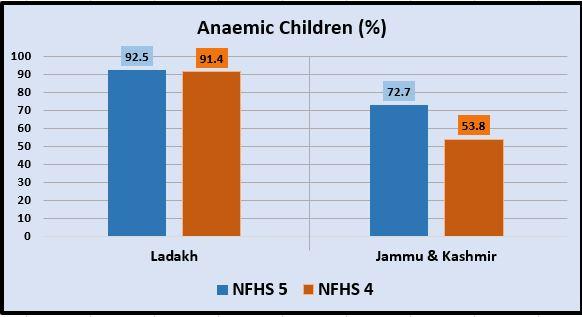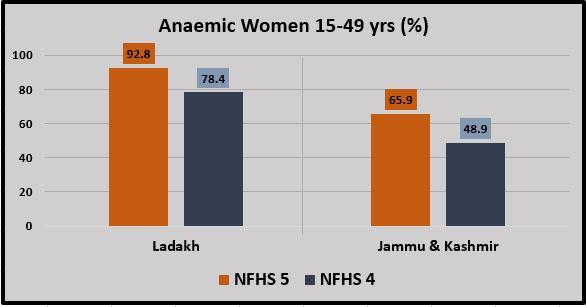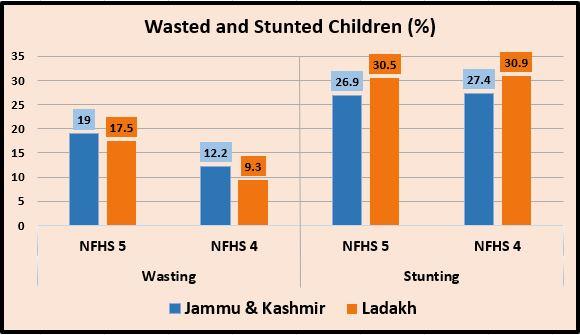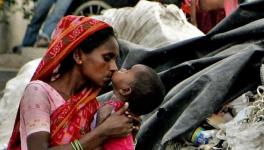Health Survey Indicates Increase in Anaemia, Wasting Among Children in Jammu and Kashmir
Representational use only
Jammu: At Dholian village in Jammu’s Bari Brahmana, children are not receiving adequate mid-day meals since the COVID-19 induced lockdown. Dholian is populated by daily wagers, factory and sanitation workers, most from dalit community, whose children heavily depend on the food they obtain in mid-day meals.
However, since the first lockdown was announced, the families from this village allege, they have not been provided with any meals. Not only that, even now as the country is going through a unlock phase, they are receiving dry ration consisting only of rice.
They have also alleged that they were eating less nutritious diet even before the pandemic hit. “We didn’t receive eggs, milk, peas or any dal. My husband earns Rs 5-6,000 every month. We are not able to feed our three children on a daily basis. We cook food just once a day. Rice is not sufficient for our children,” said Devi, a resident of the village and mother of three children.
Not just Dholian, in Kothgari village of Akhnoor, 35 km from Jammu, the villagers have a similar story to share. They, too, allege that their children have no access to the mid-day meal ration. Rakesh Kumar, a member of the village panchayat, said that even before COVID-19, children were not served with proper meals. “Mid-day meals are not available for the children in our village. We have raised this issue in the past but no action has been taken,” he told NewsClick.
These mid days meals are crucial not only for providing nutrition to children but for their overall development. Inaccessibility to these meals is an indicator of the poor implementation of the government’s mid-day meal scheme. The same has been reflected in the latest data revealed by the National Family Health Survey (NFHS), which has showed increase in the percentage of children suffering from anaemia, underweight, wasting and other symptoms which are attributable to lack of nutritious food and imbalanced, deficient diet.

A striking growth in anaemia among small children has been reported in the NFHS data, from 53.8% (figures as per the last survey conducted by NFHS 4) to 72.7% in Jammu and Kashmir; and from 91.4% to 92.5% in Ladakh. (See chart below). Anaemia is caused by the deficiency of iron and has adverse effect on the physical and cognitive development of the young children.
The increase in anaemia is not only restricted to young children but is also prevalent among women and men. There has be a 15.3% rise in anaemia among non-pregnant women in the age 15-49 years in J&K and 18% rise in Ladakh. At the same time, however, there has been a slight decrease in anaemia among pregnant women in both the regions. (See chart below)

It must be noted that the increase in the data has been showed in comparison to the data recorded in the last NFHS-4 survey conducted in 2015-16. The latest data pertains to a time before COVID-19 crisis and since the outbreak of the virus, the condition has further deteriorated.
There is also an increase in underweight and wasting (low height for weight) among young children. Children under 5 years who are wasted has increased from 12.2 to 19% in Jammu and Kashmir and 9.3 to 17.5% in Ladakh. Wasting in children caused by acute food shortage. There has also been an increase in underweight children in both the regions.

However, there is a marginal decrease in stunted (low height for age) children from 30.9 to 30.5% in Ladakh and 27.4 to 26.9% in Jammu and Kashmir.
Feminda, an anganwadi worker from Kulgam in Kashmir said that they have not been receiving sufficient ration to distribute to the poor families. “We have only received rice four times since the outbreak of COVID and that too was not sufficient to distribute to 40 families. The families are really poor and can’t afford two meals a day, but we are equally helpless.”
Get the latest reports & analysis with people's perspective on Protests, movements & deep analytical videos, discussions of the current affairs in your Telegram app. Subscribe to NewsClick's Telegram channel & get Real-Time updates on stories, as they get published on our website.















